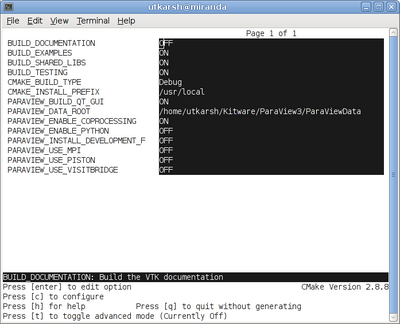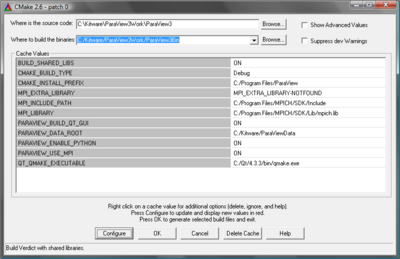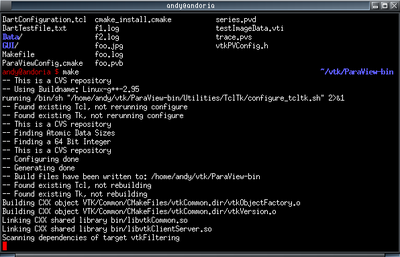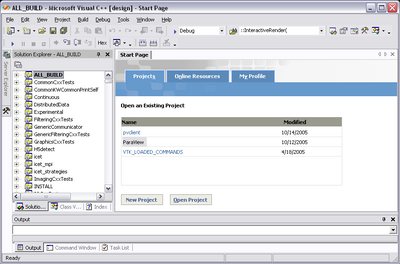ParaView:Build And Install: Difference between revisions
m (→Notes) |
|||
| Line 277: | Line 277: | ||
|} | |} | ||
== Notes == | |||
=== Compiling on the Mac === | |||
To compile on the Mac, follow the instructions for Unix (make sure that X11 is installed). Make sure to read [http://www.paraview.org/Wiki/ParaView:FAQ#How_do_I_compile_ParaView_for_Mac_OS_X.3F this] first. | To compile on the Mac, follow the instructions for Unix (make sure that X11 is installed). Make sure to read [http://www.paraview.org/Wiki/ParaView:FAQ#How_do_I_compile_ParaView_for_Mac_OS_X.3F this] first. | ||
{{ParaView/Template/Footer}} | {{ParaView/Template/Footer}} | ||
Revision as of 18:42, 23 August 2006
Introduction
This page describes how to build and install ParaView. It covers both the release and the development versions. Also, it covers both Unix-type systems (Linux, HP-UX, Solaris) as well as Windows.
Prerequisites
The ParaView build process requires CMake version 2.0.6 or higher and a working compiler. On Unix-like operating systems, it also requires Make, while on Windows it requires Visual Studio (6, 7, or 7.1).
In order to run ParaView in parallel, MPI [1], [2] is also required.
Download And Install Cmake
CMake is a tool that makes cross-platform building simple. On several systems it will probably be already installed. If it is not, please use the following instructions to install it. If CMake does not exist on the system, and there are no pre-compiled binaries, use the instructions below on how to build it.
Use Binaries
There are several precompiled binaries available at the CMake download page.
On Unix-like operating systemsLet's say on Linux, download the appropriate version and follow these instructions: cd $HOME wget http://www.cmake.org/files/v2.4/cmake-2.4.3-Linux-i386.tar.gz mkdir software cd software tar xvfz ../cmake-2.4.3-Linux-i386.tar.gz
|
On Windows
On Windows, if you are not administrator
|
Build Your Own CMake
On Unix-like operating systemsDownload the source code http://www.cmake.org/files/v2.0/cmake-2.0.6.tar.gz cd $HOME wget http://www.cmake.org/files/v2.4/cmake-2.4.3.tar.gz tar xvfz cmake-2.4.3.tar.gz mkdir cmake-2.4.3-bin cd cmake-2.4.3-bin ../cmake-2.4.3/bootstrap --prefix=$HOME/software make make install
|
On WindowsTo build CMake on windows, a previous version of CMake is required. This can be downloaded from the CMake download page. |
Build ParaView
Download ParaView Source Code
If you are trying to build a ParaView release, download it from the release page. For the development version, please follow the instructions below for checking it out from CVS.
Download The Release
You can always download the binaries from ParaView download page. This page contains binaries for several platforms and the source code for the releases.
Checkout Development Version from CVS
On Unix-like operating systemsmkdir $HOME/projects cd $HOME/projects cvs -d:pserver:anoncvs@www.paraview.org:/cvsroot/ParaView login <enter> cvs -d:pserver:anoncvs@www.paraview.org:/cvsroot/ParaView co ParaView |
On WindowsIf you have Cygwin or Mingw shell, then use them, and follow the instructions for Unix-like oprating systems. If you are on Windows and do not have Cygwin or Mingw shell, please download a CVS client. We recommend TortoiseCVS, which is a GUI for CVS on Windows. |
Configure ParaView With CMake
- Always use a separate build directory. Do not build in the source directory.
On Unix-like systems
mkdir $HOME/projects/ParaView-bin cd $HOME/projects/ParaView-bin ccmake $HOME/projects/ParaView About CCMake (Curses CMake GUI)
|
On Windows
About CMakeSetup (Windows CMake GUI)
|
ParaView Settings
| Variable | Description |
| BUILD_SHARED_LIBS | If ON, use shared libraries. This way executables are smaller, but you have to make sure the shared libraries are on every system on the cluster. |
| VTK_USE_MPI | Turn this to ON to enable MPI. Other MPI options will not be available until you turn this on. |
| MPI_LIBRARY | Path to the MPI library (such as /usr/lib/libmpi.so). Should be found by default, but you may have to set it. |
| MPI_EXTRA_LIBRARY | Path to extra MPI library (such as /usr/lib/libmpi++.so). If the MPI distribution is MPICH, this may not be found; in this case, it is ok for this variable to be set to MPI_EXTRA_LIBRARY-NOTFOUND. |
| MPI_INCLUDE_PATH | Path to MPI includes (such as /usr/include/mpi). Again, this should be found by default. |
Finish Configuring ParaView
Using CCMake
|
Using CMakeSetup
|
Build ParaView
You can now build ParaView using the appropriate build system.
Using MakeCMake will now generate Make files. These makefiles have all dependencies and all rules to build ParaView on this system. You should not however try to move the build directory to another location on this system or to another system. Once you have makefiles you should be able to just type: make
make -j 4 |
Install ParaView
ParaView can be run directly from the build directory. That said, for production environments, it should be installed in some system location.
Using MakeOn Unix-like operating systems, the install location is /usr, /usr/local, /opt, or something similar. To install ParaView, simply run: make install Make sure to have write access to this location. If you do not, it may be necessary to run install as an administrator. For example, on Unix you would do something like: su <root password> make install |
Using Visual StudioOn Windows, this location is something like c:\Program Files\ParaView. To install ParaView, simply run INSTALL target within the build system. |
Notes
Compiling on the Mac
To compile on the Mac, follow the instructions for Unix (make sure that X11 is installed). Make sure to read this first.



